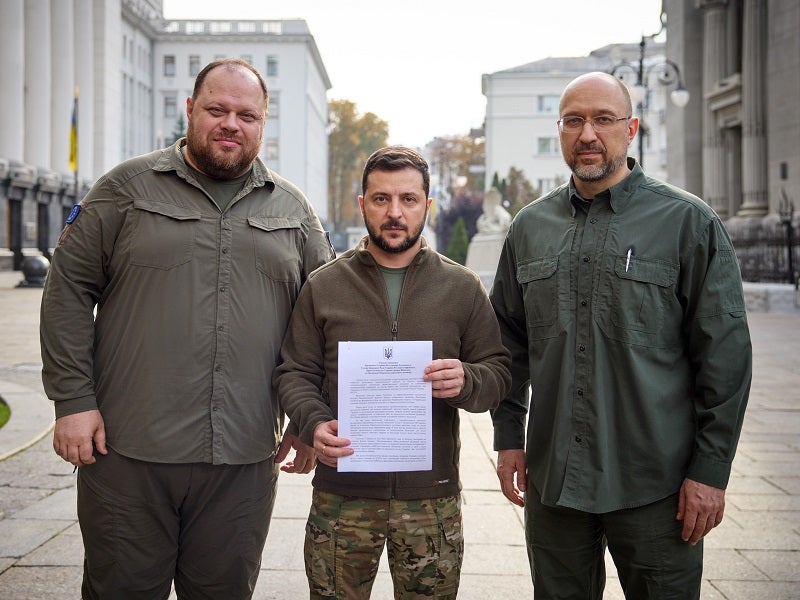Russia’s annexation of the Ukrainian regions of Donestk, Luhansk, Zaporizhzhia, and Kherson marks a key point in the more than seven-month-long war, a conflict that has resulted in tens of thousands of military and civilian deaths and threatens to send Europe hurtling into a second Cold War.
From the weeks leading up to the 24 February invasion of Ukraine to present, Putin’s aim has been the toppling of Ukrainian President Volodymyr Zelenskyy and the installation of a puppet government in Kyiv, likely creating an ‘autonomous Republic’ inside the boundaries of a neo-imperial Novorossiya (New Russia). This annexation is the bare minimum that Russian President Vladimir Putin would be able to sell to supporters of the war in Russia and his regime.
However, the attempted blitzkrieg of Kyiv fell apart following Ukrainian resistance, aided by the supply of crucial weapons by NATO members, and intelligence provision by countries such as the US. More sustained operations in the east and south swallowed up nearly 20% of Ukrainian territory, the majority of which has now been annexed with the formation of new ‘Republics’ that are in effect part of the Russian state.
Prior to the 30 September annexation, Putin had raised the spectre of nuclear war, vowing to utilise any and all means to defend Russian territory. Notwithstanding Russia’s annexation of the Crimean Peninsula in 2014, the four newly claimed territories Moscow has seized moves the nuclear tripwire hundreds of kilometres west towards European heartlands.
International condemnation
In a rambling annexation address, Putin lambasted a “Western hegemony”, blaming “Anglo-Saxons” for the apparent sabotage of the Nord Stream 1 and Nord Stream 2 pipelines in the Baltic Sea, and vowed to lead the charge in the creation of a new world order.
Response from western leaders and diplomats was widespread, with scores coming out to condemn the move and reiterate their support for Ukraine and its territorial integrity.
Wopke Hoekstra, Foreign Minister of the Netherlands, said that the “illegal annexation” by Russian of Ukrainian territory was “utterly unacceptable”, adding that there was “no place for this type of violent imperialism in the 21st Century”.
US Secretary of State Anthony Blinken called the annexation a “shameless effort to legitimise [Putin’s] attempted land grab” and that Ukraine had “every right to defend its land, its people” and to “take back” occupied territory.
António Guterres, Secretary General of the United Nations, earlier stated on social media on 29 September that an annexation would be a “violation of the principles of the UN Charter and international law”.
Ukraine again targets NATO membership
In a statement delivered through the Office of the President of Ukraine, Volodymyr Zelensky called Ukraine and NATO “de-facto allies”, with Kyiv having “proven interoperability” with NATO standards.
To this end, Zelensky stated that he had directed his government to legislate for “everything we have achieved de facto”, in effect moving to formalise Ukrainian membership of NATO and with it the Article 5 mutual defence clause that it afforded to all member states.
“We trust each other, we help each other, and we protect each other. This is what the Alliance is. De facto. Today, Ukraine is applying to make it de jure. Under a procedure consistent with our significance for the protection of our entire community. Under an accelerated procedure,” Zelensky said in the 30 September statement following Russia’s annexation of its territory.
“We know it’s possible. We have seen Finland and Sweden start accession to the Alliance this year without a Membership Action Plan.”
Speaking hours after the annexation, NATO Secretary General Jens Stoltenberg said that the move was the largest attempted land grab of European territory by force since the Second World War, amounting to some 15% of Ukrainian territory, equating to an area around the size of Portugal.
On Ukraine’s application to join NATO, Stoltenberg said that “every democracy has the right” to apply to join the Alliance and that the “door remains open”.
However, Stoltenberg was at pains to emphasise that NATO was “not party to the conflict”, and was rather “supporting” Ukraine’s fight, which if it were to fail would see the country “cease to exist” and embolden Russia.
“This is the most serious escalation [since the 24 February invasion], a combination of mobilisation [of Russian military reserves], reckless nuclear rhetoric, and illegal annexation. Together this is the most serious escalation of the conflict,” Stoltenberg said.
Russia has allies, but limited options
However, Russia is not as isolated as might be thought. Backed by the economic and political powers of China and India, with other keys allies such as Iran, Moscow will be confident that it can reshape its economy towards new markets. India wants Russian fossil fuels and has readily stepped in to fill the gap of departing European customers, while Iran is sending its capable uncrewed technologies to Russia in a bid to play its own part in countering US global influence.
Ukraine, battling to retain its status as a sovereign country, has become a battleground in an ideological proxy war that has been decades in the making, as powers in the east seek to challenge the unipolar US-led global structure.
President Putin has played nearly his final card, daring NATO to continue to back Ukraine and retake what Moscow now considers Russian land, populated by Russian people. Ukraine, backed and bankrolled by NATO, with its more motivated and better-trained forces, has regained the upper hand on the conventional battlefield.
Should NATO not blink, the only step left for Putin to avoid defeat, if not removed from power in an internal struggle, will be to cross the nuclear Rubicon.





